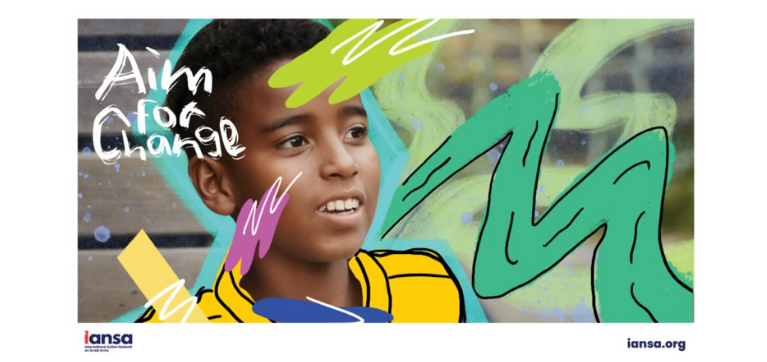Aim for Change: Algonquin College Students to Speak at UN Meeting
Posted on Tuesday, July 27th, 2021

Imagine being 18 years old, in your first year at Algonquin College and you’re about to speak before a prominent international organization. For first year Public Relations student Shelby Richardson, this is her future. Richardson and fellow students Catherine Matovu, Anna Ranger and Amarjeet Singh, alongside supervisor Jed Looker, will be presenting at a United Nations meeting on July 27.
“I feel nervous and very proud and confident, but I don’t know how it’s going to go,” said Richardson, a Public Relations student at Algonquin. “You wonder, ‘how did I get here?’ You have imposter syndrome. You worked hard and that’s how I’m here. I’m proud, especially during COVID.”
The four students and their supervisor researched the topic of gun violence and masculinity, spoke with their client IANSA – the International Action Network on Small Arms – and stakeholders including Gun Free South Africa, and have created a workshop for youth aged 12-15. They will be presenting their findings and recommendations to a United Nations international panel on Tuesday. The goal is to have the workshop available not only in South Africa but in other countries including Afghanistan and Pakistan.
“The project lasted nine weeks,” said Looker, Research Chair, Human-Centred Design Institute and Coordinator, Interdisciplinary Studies in Human-Centred Design. “We took a co-design approach, working collaboratively with IANSA and GFSA in South Africa. There were four phases to project development: the research phase, where we positioned ourselves in the context of our user group; the ideation phase, where we explored evidence-based strategies for tackling the problem space; the design phase, where we developed project outcomes; and the upcoming testing phase, where we will be evaluating the effectiveness of these outcomes with our user group.”
Looker explained what they created. “We built a workshop for youth in South Africa who are exposed to gun violence and gangs in their community. We asked ourselves: how might we develop after-school programming that provides kids a positive platform for not only sharing their experience of living with gun violence, but becoming advocates for change?”
For 21-year-old Computer Programming student Amarjeet Singh, the project has made a big impression. “It’s a very impactful thing to do,” he said. “These are the biggest issues out there – gun violence and masculinity – they are strongly connected. We developed a campaign to target children, where it all starts, and we are hoping it will be very impactful. Ultimately it could be used in other countries as well. It’s modular, things can be added and taking away. It’s pretty incredible.”
Catherine Matovu had a similar experience. “Starting a project like that from scratch was new but we were able to think outside of the box and step outside of our comfort zone,” said the 34-year-old Graphic Design student. “It was an opportunity to learn, and I welcome that. Just being immersed in social issues, that was new for me. But to be immersed in that world by reading academic info and working with Gun Free South Africa, it was a great project to be part of. It was a great learning experience.”
Victimology student Anna Ranger, 22 was impressed by how much was accomplished online. “It was such a rewarding process from start to finish,” she said. “I had no experience, and it was very new and beyond my comfort zone. But the way it all came together was incredible; to watch the idea being created and evolve and getting input from people on the ground in South Africa. All this work has been done virtually and has such a tangible effect. It’s surreal: now we are presenting to the UN. I’m humbled by the experience and proud of the work we’ve accomplished and nervous for sure.”
The presentation is July 27 at 1:15 p.m. during the Programme of Action on Small Arms and Light Weapons – Seventh Biennial Meeting of States, as part of the United Nations Action on Small Arms that meets every two years.
About the Event
Creativity and Collaboration – New Ways to Address Youth and Gun Violence Organized by the International Action Network on Small Arms (IANSA). Sponsored by the European Union and Canada
About the Student Campaign
Aim for Change is a youth-focused workshop developed by the Algonquin College Human-Centred Design Institute in partnership with the International Action Network on Small Arms (IANSA) to tackle the growing issues of gun violence and masculinity around the world. The workshop gives youth affected by these issues the opportunity to share their stories. To learn more, please visit iansa.org.
Aim for Change is the name of the campaign developed by the student team that includes:
- Media Kit
- Messaging
- Playbook
- Website
About the International Action Network on Small Arms
A global movement that unites hundreds of organizations working to stop gun violence. Aim for Change was created as part of IANSA’s “Civil society. engagement in support of gender mainstreamed policies, programmes and actions in the fight against small arms trafficking and misuse, in line with the Women, Peace and Security agenda”, which is funded by the United Nations.
About the Algonquin College Human Centered Design Institute
An agency within Applied Research, Innovation & Entrepreneurship (ARIE) that works with industry partners providing valuable experiential learning opportunities through multidisciplinary team work in various programs across the college.
Gun Free South Africa (GFSA)
Provided real-world feedback and will be testing the workshop in Capetown and Johannesburg.
- Posted in
- News